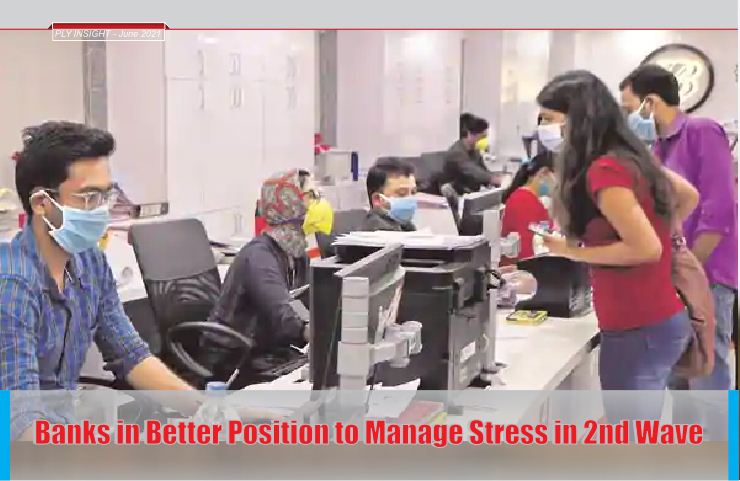
Banks in Better Position to Manage Stress in 2nd Wave
- June 24, 2021
- 0
Banks are better placed in this Covid wave to manage stress in balance sheets than before, the RBI said, helped by higher capital buffers, improvement in recoveries and a return to profitability.
As the country battles a second wave of infections, state governments have imposed localised lockdowns to contain the spread. These curbs have hit economic activity, leading to job and business loss and increased stress in the system.
In its annual report, the Reserve Bank of India (RBI) said banks’ asset quality will need to be closely monitored in the coming quarters, with preparedness for higher provisioning against the backdrop of the Supreme Court lifting an interim stay on asset classification.
The waiving of ‘interest on interest’ charged on loans during the moratorium period (March 1, 2020, to August 31, 2020) may also impinge on lending institutions’ finances.
Stress tests indicate that banks have sufficient capital at the aggregate level even in a severe-stress scenario. Bank-wise as well as system-wide, supervisory stress testing provide clues for a forward-looking identification of vulnerable areas, the RBI added.
According to RBI data, the capital adequacy ratio (CAR) of banks rose to 15.9 per cent in December 2020 from 14.8 per cent in March 2020, on capital raising from the market, and retention of profits.
The gross non-performing assets (GNPA) ratio of banks decreased to 6.8 per cent in December 2020 from 8.2 per cent in March 2020.
The proposed bad bank, the regulatory measures aimed at developing market-based mechanisms for credit risk transfer, such as securitisation, transfer of loan exposures and development of secondary loan market may help in reducing the stressed assets on the bank balance sheets.
The health of the banking sector emerged as a priority for the RBI as it sought to cushion the system from the pandemic (first wave). A number of measures were put in place to mitigate its impact. Some of them were easier access to working capital, moratorium, asset classification standstill, restriction on dividend pay-outs, permitting restructuring of viable accounts, it added.
बैंक हालिया दबाव सहने में अधिक सक्षम
भारतीय रिजर्व बैंक (आरबीआई) ने कहा कि बैंक मौजूदा कोविड की लहर में खाता बही में दबाव के प्रबंधन में पहले से अच्छी स्थिति में हैं। उन्हें उच्च पूंजी बफर, वसूली में सुधार आने और लाभी की ओर वापसी करने से मजबूती मिली है।
कोविड-19 संक्रमणों की दूसरी लहर के बीच राज्य सरकारों ने इसके प्रसार को रोकने के लिए स्थानीय स्तर पर लाॅकडाउन लागू किया है। इन रोकथामों से आर्थिक गतिविधि को धक्का लगा है जिसके कारण नौकरी और कारोबार को नुकसान हो रहा है और व्यवस्था में दबाव बढ़ा है।
अपनी वार्षिक रिपोर्ट में रिजर्व बैंक ने कहा कि आगामी तिमाहियों में बैंकों की संपत्ति गुणवत्ता पर करीब से नजर रखने की जरूरत होगी। साथ ही संपत्ति के वर्गीकरण पर सर्वोच्च न्यायालय द्वारा लगाए गए अंतरिम रोक के हटने पर उच्च प्रावधानों के लिए तैयार रहना होगा।
ऋण पुनर्भुगतान पर मोहलत अवधि (1 मार्च, 2020 से 31 अगस्त 2020) के दौरान वसूले गए ऋणों के ब्याज पर ब्याज को माफ करने का बोझ भी ऋणदाता संस्थाओं के वित्त पर पड़ सकता है। दबाव परीक्षणों से संकेत मिलता है कि बैंकों के पास समग्र स्तर पर अत्यधिक दबाव परिदृश्य में भी पर्याप्त पूंजी है।
रिजर्व बैंक के आंकड़ों के मुताबिक बैंकों की पूंजी पर्याप्तता अनुपात (सीएआर) मार्च 2020 के 14.8 फीसदी से बढ़कर दिसंबर 2020 में 15.9 फीसदी हो गई।
































































